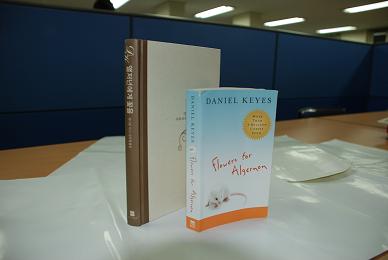Flowers for Algernon, a story of Charie Gordon
 | ||
| Flowers for Algernon |
| |
| By Daniel Keyes | ||
A KIND, yet mentally ill man lives in New York. One day, he is offered an operation that could increase his intelligence and he takes it. He becomes an extraordinarily intelligent person, but life does not turn out to be so happy after his surgery. In Flowers for Algernon, the author, Daniel Keyes, portrays interesting issues with a unique style of writing.
A first-person narration
The story is narrated in the first person based on the diaries of Charlie Gordon, who is the main character. The doctors who operated on him asked him to write a report everyday to watch the development of his intelligence. At first, he can hardly use exact orthography and punctuation. For example, he writes "I am 32 yeres old and next munth is my brithday." After the surgery, however, his writing is remarkably improved, and he often quotes passages from difficult academic theories that even the doctors cannot understand. This form of narration effectively delivers Charlie's train of thought, such as his anticipation to become smart, his confusion from the abrupt rush of knowledge, and his memories of a lost past. Thus, the readers are easily absorbed in to the text, reading Charlie's diaries and feeling as if they are walking along with him. Neglected human dignity The doctors experimented on Charlie and Algernon, a laboratory mouse, to increase brain capacity. Because of Charlie's low intelligence, the doctors did not seriously consider if it is right or wrong to experiment on a man and they treated him the same as Algernon. Also, the doctors did not have any counterplans in case something went wrong. When presenting the outcome of the experiment, the doctors introduced Charlie, saying "... In one sense, he was the result of the modern psychological experimentation. ... a burden on the society that must fear his irresponsible behavior...." Blinded by their desire for fame, they used Charlie even though they were uncertain about the result. In response, Charlie shouted in despair, "I'm a human being, a person - with parents and memories and a history - and I was before you ever wheeled me into that operating room!" At this point, the readers can think about the human dignity in science.
Almighty knowledge?
When Charlie was a mentally retarded man, people ignored and treated him badly. Though, he had many friends and could have a steady job. After he became highly intelligent from the surgery, however, people thought of him as an intellectual but started to avoid him. He lost all his friends and his job, as well. Although he suddenly became a multilingual and came to understand all sorts of abstract theories, he lost his humane aspects such as pureness and innocence. In addition, with the sudden rise of IQ, he forgot how to love people genuinely, how to be generous to other people, and to be responsible for his actions. He had acquired knowledge to understand the basic principles of life, but could not feel the emotions of a normal person. Therefore, he could not adapt to the society. This makes the readers wonder whether one's high intelligence acquired artificially is a good thing or not.
* * *
Flowers for Algernon includes issues worthy to think about: the ethics in science and the problem of a sudden rise in intelligence quotient without a balanced emotional quotient. The theme and content make it easy for readers to identify themselves with Charlie. He was an incomplete genius who finally could not find true happiness in his life. All he could do was to put some flowers on Algernon's grave.
If you like this book…
1. Algernon, Charlie, and I: A Writer's
Journey by Daniel Keyes
2. Of mice and Men by John Steinbeck
3. Des Fleurs pour Algernon, a French movie

